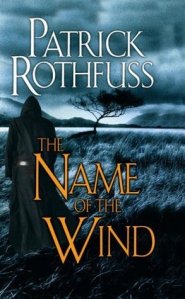So for this semester in my pursuit of the F for my M.A., I don’t have to post my thoughts in my blog. But since I also have to be slightly more analytical and formal, I thought I’d post here as well, with my original essay but extra fun bits thrown in just for the blog crowd. This time around we’re tackling Recent Science Fiction and Fantasy. Our first victim: a little ditty called The Name of the Wind, by Patrick Rothfuss.
The Name of the Wind was always one of those books that I would pick up, turn it around in my hands a few times, read the back cover, and put back down. It incessantly caught my eye when I worked at Borders and would shelve in the Fantasy section. But I never got around to actually giving it a try. I always enjoy a great epic fantasy, especially one like this that is told in such a lyrical, dramatic way, a bard’s tale if you will. But I am also a fan of the humble, and while Kvothe is definitely human and makes many, many human mistakes, he is also (and maybe rightfully so) a bit on the arrogant side. And people like that usually turn me off, both in fiction and in real life. In fact, this book may be a great example of what not to put on the back as a snippet. On the back of the version I have (the big trade paperback from the library), in between the blurbs from other writers, is part of what Kvothe says to Chronicler to start out his story:
I have stolen princesses back from sleeping barrow kings. I burned down the town of Trebon. I have spent the night with Felurian and left with both my sanity and my life. I was expelled from the University at a younger age than most people are allowed in. I tread paths by moonlight that others fear to speak of during day. I have talked to Gods, loved women, and written songs that make the minstrels weep.
You may have heard of me. (53)
Reading this always instantly turned me off to the main character. Now that I’ve read it, I understand more, but I can also see why people may get turned off by Kvothe at the same time.

Was surprised at all the fan art! Here’s one I really like by Marc Simonetti. Find it here: http://marcsimonetti.deviantart.com/art/The-Name-of-the-Wind-123640928
What I appreciated most about this book was the style. I’ve always been a fan of the more lyrical, song-like language and descriptions (dare I even say, a little purple prose thrown in here and there). I tend to write like this sometimes, so I appreciate it when it is well-done in other places. The format the Rothfuss uses, that of a story within a story, also lends itself to the style. For all the things that Kvothe has become, he is, in his core and blood, a performer. If he were telling a tale about any other hero it would have the same tone and slight exaggerations. But he is telling it about himself, which puts the performing qualities into a bit of a different light. Most people, when telling a story about themselves, may embellish a little, but I feel that most of us usually try to cast ourselves in more of a humble light. Not so with Kvothe, but when you are born to do great things, I suppose that comes with the territory. You can tell that he’s trying not to brag, but when someone talks about doing fantastical things in more of a matter-of-fact way, you still get a degree of awe mixed with disbelief. Kvothe realizes that he is no ordinary man, and tries to tell his story the way a more ordinary man might tell the story of his life. But it still comes across with enough nonchalance to possibly make the reader not like him very much.
The format of story-within-story is clever because it makes you wonder some about the overall narrator. Kvothe is telling the story of his past to Chronicler, but who is telling the story of present-day Kvothe telling his story?
On a personal note, there is one thing I really enjoyed about The Name of the Wind, and that was how Rothfuss wrote music, and the playing of music, and the feeling of music swelling within Kvothe. In scenes like after his parents’ deaths, when Kvothe is wandering around the forest on his own, with music as his only solace, the descriptions of how he plays was very natural and organic: “I began to play something other than songs. When the sun warms the grass and the breeze cools you, it feels a certain way. I would play until I got the feelings right. I would play until it sounded like Warm Grass and Cool Breeze” (128). Since my current WIP is centered around music, it showed me a great example of how to describe music when it is so important to the character.
*Okay, here is some extra snark and love just for blog readers. One thing that personally annoyed me about this book was Kvothe’s name. I just couldn’t say it in my head, and stumbled every time I saw it. He even says in the book how to pronounce it (supposedly it sounds just like the word “quothe”, but I still had a hard time with it. If you have to put in the book itself how to pronounce your main character’s name, I kinda feel like it’s a little too much of a mouthful. Or at least give the poor guy a nickname. I mean, when I first read about Daenerys in Game of Thrones, yeah it’s a little hard to get around. But she often becomes Dani, so that even when you see the name Daenerys, you think Dani. I do that in my book Blood and Ambrosia (not it’s not out, still working on that part!): my main character is Larkeyae, which no one I’ve met can every say. But she’s really just Larke for most of the book, so it’s okay. Not sure what kind of nickname you can make from Kvothe though. He’s just stuck.
One other thing that super tickled me about this book, and this is for all the gamers out there. Right in the beginning, when Kvothe is trying to pretend that he’s just an innkeep named Kote, someone thinks they recognize him. Kvothe suddenly almost falls, and then tells them that he once took an arrow to the knee… Now this was published a few years before Skyrim, so there’s not really any correlation. But come on, you know you really can’t hear “arrow to the knee” anymore without thinking of a Skyrim joke.
Okay, back to the more formal!*
I am glad I have finally gotten to read this book, and definitely want to read the next one. The Name of the Wind has all the qualities that good epic fantasy should have: sweeping landscapes, a compelling hero, a robust mythology, and a threatening, lurking Evil. Couple this with a style that seems both new and familiar at the same time and you get a book that manages to stand on its own next to the greats.
Works Cited—Rothfuss, Patrick. The Name of the Wind. New York: DAW Books, 2007. Print.


